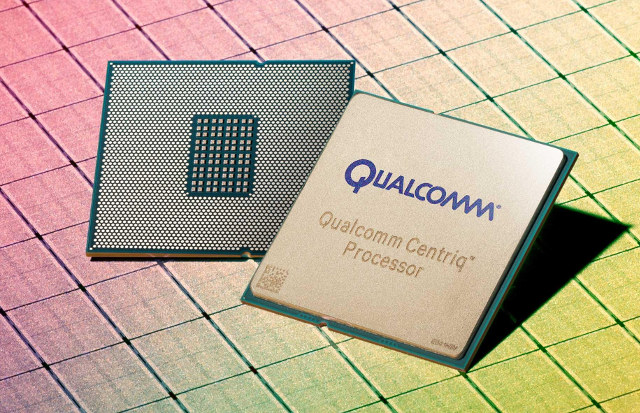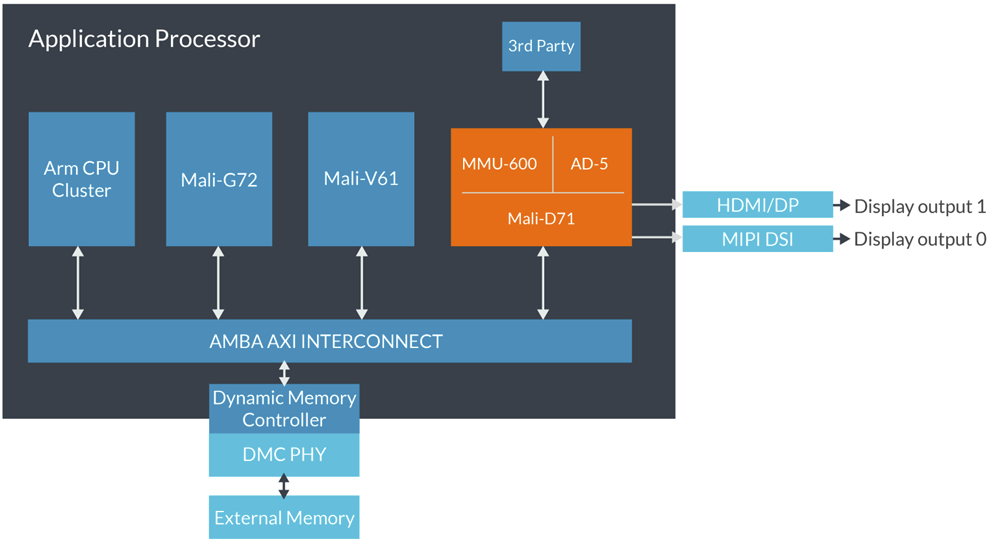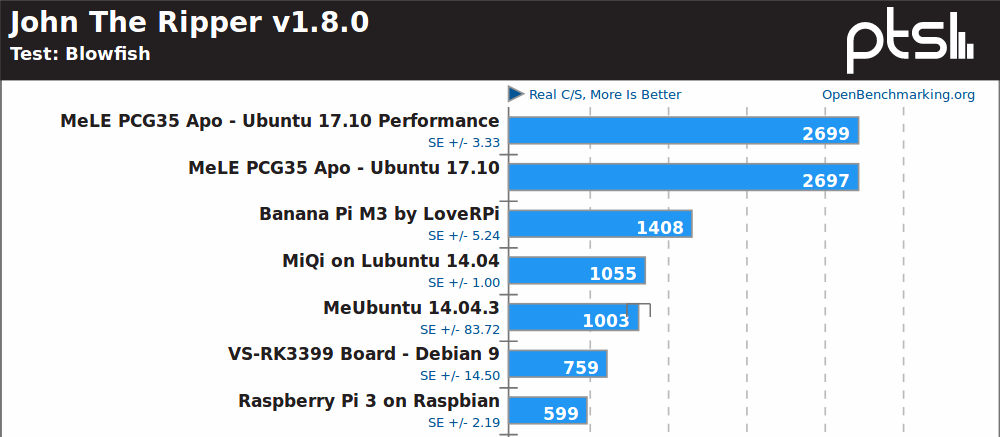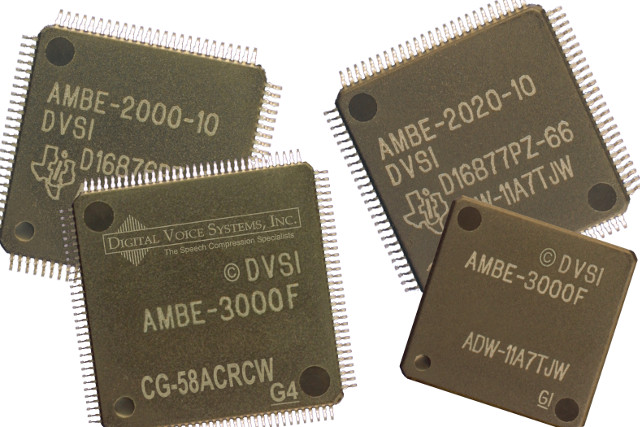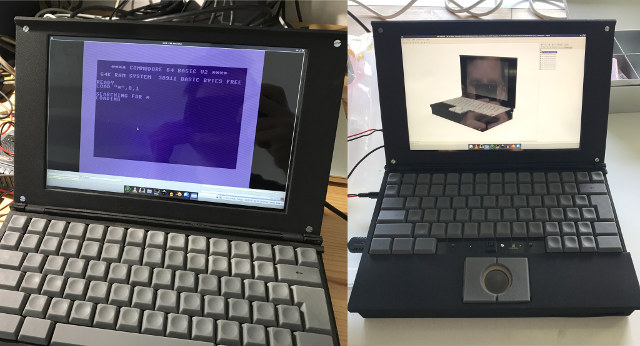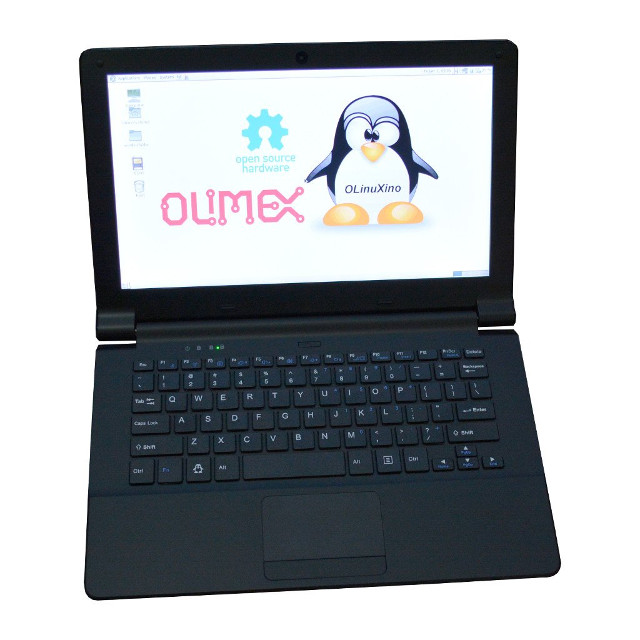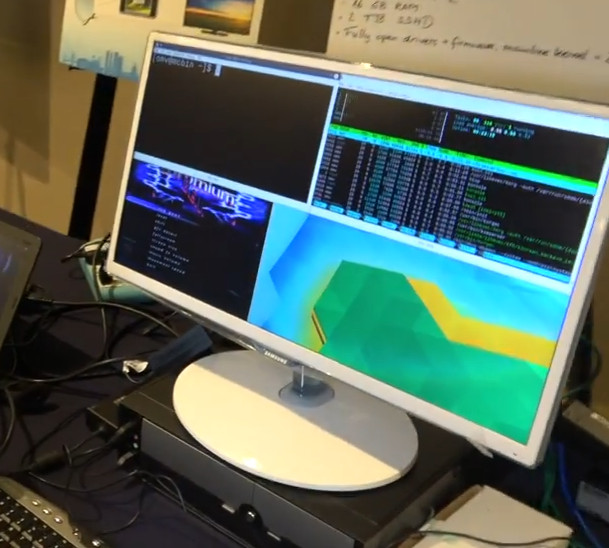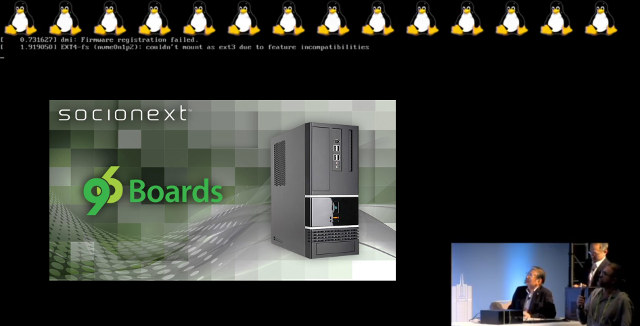Qualcomm Centriq 2400 ARM Server-on-Chip has been four years in the making. The company announced sampling in Q4 2016 using 10nm FinFET process technology with the SoC featuring up to 48 Qualcomm Falkor ARMv8 CPU cores optimized for datacenter workloads. More recently, Qualcomm provided a few more details about the Falkor core, fully customized with a 64-bit only micro-architecture based on ARMv8 / Aarch64. Finally, here it is as the SoC formally launched with the company announcing commercial shipments of Centriq 2400 SoCs. Qualcom Centriq 2400 key features and specifications: CPU – Up to 48 physical ARMv8 compliant 64-bit only Falkor cores @ 2.2 GHz (base frequency) / 2.6 GHz (peak frequency) Cache – 64 KB L1 instructions cache with 24 KB single-cycle L0 cache, 512 KB L2 cache per duplex; 60 MB unified L3 cache; Cache QoS Memory – 6 channels of DDR4 2667 MT/s for up to 768 […]
Arm Announces Mali-D71 for 4K/120 Hz Displays, Assertive Display 5 with HDR
Arm has just announced Mali-D71 display processor optimized for 4K120 displays used for virtual reality, Assertive Display 5 display management core which adds support for high dynamic range (HDR10 / HLG), as well as CoreLink MMU-600 system memory management unit to handle data feed to Mali-D71, with the integration leading to a 55% area saving for the combined solution and a 50% latency improvement. Mali-D71 Display Processor The main advantages of D71 display processor include: 30% system power savings by fully offloading GPU workloads before output such as composition, rotation, high-quality scaling, and other imaging processing in fixed function hardware. 2x area efficiency compared to Mali-DP650. When driving a single display, it can re-use the resources of a secondary display, doubling the performance. 4x latency tolerance – Mali-D71 can sustain up to 4x the delay on the system bus for the same throughput, helping maintaining high refresh rates up to […]
Linux Benchmarks – Intel J3455 Apollo Lake vs Z3735F Bay Trail vs RK3399 and Other ARM Platforms
Since I’ve just installed Ubuntu 17.10 on MeLE PCG35 Apo, I decided I should also run some benchmarks comparing with other ARM and x86 Linux platforms I’ve tested in the past.I was particularly interested to compare the performance of Intel Apollo Lake processors (Celeron J3455 in this case) against higher end ARM processors like Rockchip RK3399 (2x A72, 4x A53) since systems have a similar price (~$150+), as well as against the older Bay Trail processor to see the progress achieved over the last 2 to 3 years. To do so, I used Phoronix Benchmark Suite against Videostrong VS-RK3399 results (RK3399 development board):
|
1 2 3 4 |
sudo apt install php-cli php-gd php-xml php-zip wget http://phoronix-test-suite.com/releases/repo/pts.debian/files/phoronix-test-suite_7.4.0_all.deb sudo dpkg -i phoronix-test-suite_7.4.0_all.deb phoronix-test-suite benchmark 1709271-TY-1704029RI26 |
The benchmark first issued a warning about “powersave” governor, but I still went ahead, and once completed I change it to “performance” governor:
|
1 2 |
sudo apt install cpufrequtils sudo cpufreq-set -r -g performance |
…and ran the tests again. All results are available on OpenBenchmarking. Let’s address the governor results first. cpufreq-info reports that powersave governor […]
AMBE+2 Vocoder Promises High Voice Quality at Low (2.0 to 9.6 Kbps) Data Rates
Opus 1.2 open source audio codec was release a few months ago with the ability to deliver low power low high-quality audio bitrate for speech with bitrates as low as 12 Kbps. Digital Voice Systems (DVSI) claims to have gone even lower thanks to their AMBE+2 vocoder (Advanced MultiBand Excitation) providing high-quality speech at data rates from 2.0 to 9.6 kilobytes per second. AMBE+2 vocoder is said to outperform the company’s previous generation AMBE+ Vocoder as well as the G.729 and G.726 vocoders, while operating at only 4.0 Kbps. The vocoder is suitable for mobile radio, secure voice, satellite communication, computer telephony, digital voice and storage applications The solution can be integrated into product either using software licensing, or through Vocoder chips, and the company lists the following key benefits: Maintains speech intelligibility and speaker recognition at rates as low as 2.0 kbps Resistant to background noise and channel bit errors […]
MNT Reform DIY Modular ARM Linux Portable Computer To Feature NXP i.MX 6/8 SoC
The first usable DIY ARM Linux laptop that I can remember is Novena, unveiled in 2014, based on Freescale i.MX 6Quad processor, and fairly expensive at close to $2,000 since it was a nice product. Recently, we’ve had more affordable options with products such as Olimex TERES-I laptop (Allwinner A64), and the second version of Pi-Top laptop shell for Raspberry Pi 3. There may soon be another option as MNT Media and Technology (Lukas F. Hartmann) partnered with an industrial designer (Ana Dantas) to work on “Reform”, a DIY and modular laptop / portable computer powered by NXP i.MX 6QuadPlus quad core ARM Cortex A9 processor, and eventually i.MX 8 hexa core Cortex A72/A53 processor. They are the prototype stage right now, and mostly looking for feedback. The preliminary specifications and features of the Reform portable computer include: SoC – NXP i.MX 6QuadPlus quad core Cortex A9 processor @ up […]
Olimex TERES-I DIY OSHW Laptop Now Up for Sale for 240 Euros
Olimex has been working on their open source hardware TERES-I DIY laptop since last year. The laptop is supposed to come in kit form, so that you can build it yourself. Every board and most parts are open source to let your easily repair it, or improve it by adapting the part to your own needs. The company has now launched the laptop kit for 240 Euros in black or white. Olimex TERES-I laptop updated specifications: SoC – Allwinner A64 quad core ARM Cortex-A53 processor @ 1.2 GHz with Mali-400MP2 GPU System Memory – 2GB DDR3L Storage – 16 GB eMMC Flash, micro SD slot Display – 11.6″ LCD display with 1366×768 resolution Video Output – 1x HDMI 1.4 port Audio – Via mini HDMI, 3.5mm audio jack, 2x speakers, microphone Connectivity – 802.11 b/g/n WiFi up to 150Mbps, Bluetooth 4.0 LE USB – 2x USB port ports Front camera […]
MACCHIATOBin based DIY ARM Desktop, DragonBoard 820c based DIY ARM Laptop (Video)
2017 may be the year of the (ARM based) Linux desktop, sort of. We’ve already seen GIGABYTE ARM development PC powered by a Socionext SC2A11 Synquacer 24-core ARM Cortex A53 processor that will be available in December, and apparently working fairly well already. But there are even more options, as Bernhard Rosenkränzer (Bero) from the Linaro Mobile Group, and unofficial Linaro superstar, has decided to create his own ARM based desktop and laptop, based on respectively MACCHIATOBin board with a Marvell ARMADA 8040 quad core Cortex A72 processor, and DragonBoard 820c board with a Qualcomm Snapdragon 820 quad core Krait processor. Since MACCHIATOBin board complies with mini-ITX form factor, he could simply use off the shelf parts with a standard desktop case with power supply, NVIDIA or AMD Radeon graphics card, 16GB memory modules, and a 2 TB SSD drive. The AMD Radeon card fried due to overheating, so the […]
Short Demo with 96Boards SynQuacer 64-bit ARM Developer Box
Even if you are working on ARM platforms, you are still likely using an Intel or AMD x86 build machine, since there’s not really a good alternative in the ARM world. Linaro talked about plans to change that at Linaro Connect Budapest 2017 in March, and a few days ago, GIGABYTE SynQuacer software development platform was unveiled with a Socionext SynQuacer SC2A11 24-core Cortex-A53 processor, and everything you’d expect from a PC tower with compartment for SATA drives, PCIe slots, memory slots, multiple USB 3.0 ports, and so on. The platform was just demonstrated a Linaro Connect San Francisco right after Linaro High Performance Computing keynotes by Kanta Vekaria, Technology Strategist, Linaro, and Yasuo Nishiguchi, Socionext’s Chairman & CEO. If you have never used a system with more than 14 cores, you’d sadly learn that the tux logos at boot times will only be shown on the first line, skipping […]


